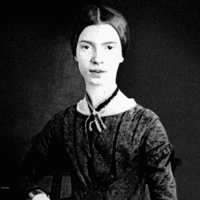Time XL. I Never lost as much but twice (49)
by Sophia Brookshire
Emily Dickinson's poem "39 (49)" is one that deals with the some of the many deaths that plagued her throughout childhood and on into adulthood. Emily lost a lot of very important people to her at a young age, which would be traumatic for any child. These losses fostered an interest in morbidity, which she would hold onto throughout her life. This poem is a ballad stanza; in this case, it consists of two quatrains with a rhyming pattern of abcb, and alternates between four and three stressed lines. Dickinson often likes to make lines two and four perfect rhymes, which is when the later part of the word or phrase is identical sounding to that of another. The protagonist of this poem, as in many of Dickinson's poems, is Emily.
The first stanza tells us that she has "never lost as much but twice," meaning that she has lost two people to death that had been very important to her. We know that they have died by her usage of the word "sod," which refers to the upper layer of soil bound by grass and roots into a close mat. She has lost them "in the sod" means that they are buried beneath the sod and are thus dead. She goes onto say that she has stood "a beggar before the door of God" twice, meaning she has prayed/begged God to send her some relief from her bereavement. She is asking God to take mercy upon her, and be as much a giving god as a god who takes.
Stanza two opens with the image of angels descending from heaven with a gift for her. God has answered her prayers and "reimbursed [her] store," meaning that he has sent her two new people to take the place of the ones that she had lost. When she lost yet another person that it was important to her she became very upset with God calling him a "burglar." Emily's faith is God has been shaken and so she turns to her father for comfort. God used to be her banker, but now she has given her father that title/role hoping that he will take pity on her and send her a new companion that will never leave her. But until he finds someone new for her, she is "poor once more."

